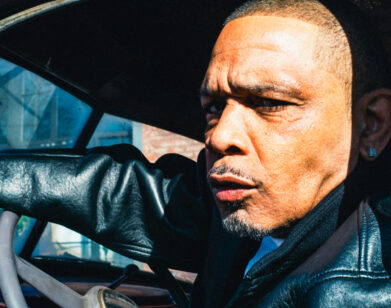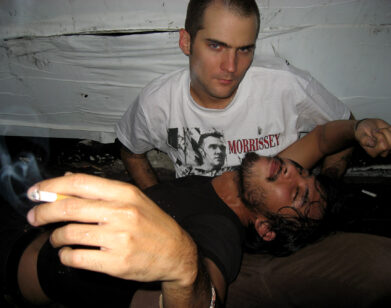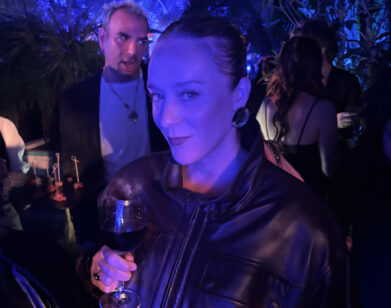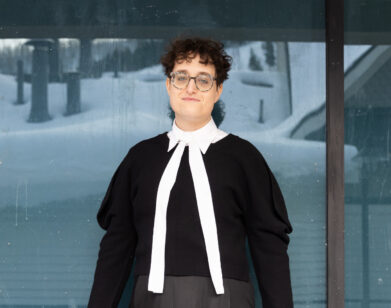Chloë Sevigny is ready for her Allison Janney phase
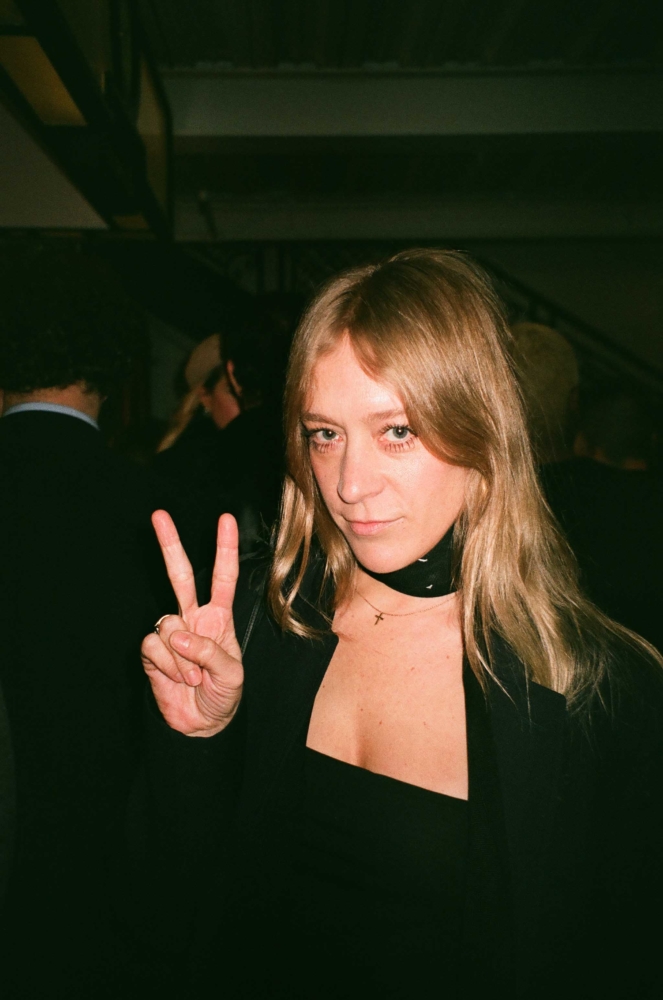
Chloë Sevigny, who’s been working consistently in movies and television for the last 23 years, is currently between jobs. I catch her on a cold spring day, during a bout with flu-like symptoms she says are the result of an outdoor photo shoot for a magazine whose name she can’t quite recall at the moment (she blames the meds).
Sevigny is currently in movie theaters starring in director Andrew Haigh’s affecting new drama Lean on Pete, the latest release from white-hot production company A24. On the surface, the movie is a story about a boy and his horse, but Haigh, who adapted the script from Willy Vlautin’s novel of the same name, has crafted something for more poignant and haunting than that plot line suggests.
Beset by a family tragedy, Charley Thompson (played by newcomer Charlie Plummer) sets off on his own across America’s rural Pacific Northwest in search of a long lost relative. Along the way, he stumbles across a local race track where he meets the titular horse and his owner, played by Steve Buscemi. While developing a strong bond with the horse, Charley also meets the steely jockey Bonnie, who has spent years in this tough, male-dominated world, and is played with weary wisdom by Sevigny. When we spoke, the 43-year-old actress was in an introspective mood, wondering aloud how her reputation as an icon of New York cool has affected her acting career, and why she’s ready for a new phase.
BEN BARNA: How are you?
CHLOË SEVIGNY: I’m okay. I survived the entire winter without getting the flu and then just this week I fell prey. I was shooting outside all weekend in scantily clad numbers, so I think that did it.
BARNA: Lean on Pete is set in rural America, a place that has for many been recontextualized in the wake of the election. People might see this movie differently than they would have two years ago? Do you think it’s fair that the movie has been affected in that way?
SEVIGNY: I think all art has been affected by that. All movies, all television, has taken on a different connotation now. Being that we’re at Portland Meadows for almost the entirety of my performance, it doesn’t seem that remote to me. I always find Portland to be a very strange city because it is very working-class and yet you have the hipster aspect of it. It’s a real melting pot in that way. It’s all very up against each other.
BARNA: Your character faces some sexism in her workplace, which some audience members might relate to the #MeToo movement. Do you think that’s a valid connection to make?
SEVIGNY: The stronger story is what’s going on with the homeless youth. But I think the movie touches on a lot of social issues, and if people want to project whatever they’re thinking about the film industry and misogyny and sexism and harassment—for me that’s in every industry. And of course it’s in sports. It’s a very physical environment to be in. There’s a lot of proximity, and I feel like that’s where film sets also get weird.
BARNA: How was a British filmmaker like Andrew able to capture such an American story. The movie is steeped in Americana.
SEVIGNY: When you’re up there in Portland and then in the surrounding towns, you can’t help but be fully immersed in it. Even the crew, there were a lot of pro-gun T-shirts. They are working-class types. There’s already that element of Americana on a film set, and there’s this weird duality that always happens between the higher-ups and the working class.
BARNA: Even on a small film like this?
SEVIGNY: Even on a small film like this. But I know Andrew had spent a lot of time with Willy, the writer of the novel, and had gone on Charley’s journey. He spent a lot of time in these towns and spent a lot of time with the horse people. I even spent a lot of time with the trainers and the jockeys, and they were very open with their experiences. A lot of them even got into their addictions to gambling and drugs. That world can be very dark.
BARNA: What specifically did you uncover about this world that you hadn’t known before?
SEVIGNY: Well, I didn’t know that much. I’ve been to like two horse races in my life, and one was the Kentucky Derby. Finding out about that world, doing some research about horses and spending a lot of time with horses, I think that was the greatest gift this movie gave me, because you can’t fake it with a horse, they can read your emotions really easily and they can sense that you’re nervous. So it was more about getting me comfortable with animals because I’d never spent any time around horses. I was terrified of them.
BARNA: This performance felt like it came very naturally to you. Did you ever feel self-conscious on set?
SEVIGNY: I did have an ex-lover in the camera department that made filming a little interesting, yes.
BARNA: You had an ex-lover in the camera department?
SEVIGNY: [laughs]
BARNA: Are you serious?
SEVIGNY: Yeah. But yeah, most of my scenes were with Steve Buscemi and we’ve known each other for 20-something years. I was in his first feature film that he directed, Trees Lounge [2000], and it was my second film. You just gotta stay focused on who you’re talking to in the scene and what the scene’s about. It’s the 101s of acting: Where am I coming from? Where am I going to? The way Andrew shoots, these long ones, you just have to dive right in because he’s not coming in for coverage, so you only get one shot. Some actors, you can tell, they’re waiting to really give it in their close-up or whatever, but you can’t do that with Andrew.
BARNA: Do you like dropping into a film like this and shooting for a week, or would you rather the project revolve around your character?
SEVIGNY: I would have liked the Charley part.
BARNA: Oh, really?
SEVIGNY: Of course! But I’m a 43-year-old woman so I don’t think that would work. Who doesn’t want that part? I find it so much easier to find the character the bigger the part it is, there’s more to sink into. But I love Andrew as a filmmaker so I’ll take what I can get.
BARNA: With the current television explosion, do you feel like there’s more opportunity than there was before?
SEVIGNY: Movie stars are doing all the television and the competition’s even fiercer. I feel like all the movie stars want to do TV because they want to get paid.
BARNA: That’s how I think of you when I see you on television—a movie star who is doing TV.
SEVIGNY: I try not to judge myself in that way. I’m trying to be kind to myself. I feel like the TV stuff is fiercer, and so then they try and get you to come in as a guest star so they don’t have to pay you. It’s a real thing, people are talking about it. I feel like actors are really getting the short end right now. And I feel like now there’s too many movies, I feel like there’s too much content. A lot of the micro-budget stuff is what I get offered and it’s such a commitment to do those really mini movies. The Alex Ross Perry film I did, Golden Exits, was a pretty small budget. But I loved that part and I love him and it was shooting around the corner from my house and that was very convenient. But a lot of them are in weird, remote locations and you’re going to be in a crappy hotel. You have to really love the project and really be into the director, unless you’re young and you don’t care and you just want to be on the road. But I’m at a place right now where I like certain comforts, and then you don’t want to be irritable because you aren’t getting those certain comforts.
BARNA: Andrew Haigh said he sees you as a character actress. Do you see yourself as one?
SEVIGNY: I feel like I would like to be thought of more as that. As like an Allison Janney, or Laurie Metcalf. I feel like it would open some doors for me. I feel like a lot more men are invited to that milieu than women. I like to think of myself as a hardworking actress.
BARNA: I feel like you’ve managed to defy labels throughout your career, which has been very versatile.
SEVIGNY: Yeah, but the press, of course, constantly does that. Always about fashion and style stuff.
BARNA: The whole “It-girl” thing.
SEVIGNY: Yeah. And I sometimes am worried, am I too much of a personality? Does that get in the way of my acting career? I just try to do the best work that I can, obviously. I don’t know what I can do to reverse anything that’s already happened. [laugh] I kind of just have to live with it at this point.
BARNA: Was there a point where you were worried that your status as a fashion icon was going to interfere with your acting career?
SEVIGNY: I guess so, but I haven’t really played a fashionable person in a movie. Fashion’s been great to me, I’ve made a lot of money, and I’ve been able to make choices in my film career that maybe I wouldn’t have been able to make. Being given all these opportunities to make crazy fashion money has permitted me to make Andrew Haigh films and Alex Ross Perry films.
BARNA: Speaking of making fashion money, I noticed that you’re selling some of your stuff on The RealReal. Can you talk about that?
SEVIGNY: Well, I’ve been in between apartments for a little while now and I had a lot of storage, and bills every month for the storage, and then I also had storage in Connecticut, and I was like, “Why do I have all of this crap?” I just felt really bogged down by it. I usually clean out my closets every six months or something, and first I’ll let my girlfriends come over and they can take anything they want. Then I would sell some stuff to whatever thrift store that I was into at that time. It was always a lot of steps. So with The RealReal, they can come clean out one of these storage spaces by getting rid of stuff that I’m holding onto for no reason.
BARNA: You gave an honest interview to the Huffington Post about Lizzie and everything that happened with that. What kind of lesson did you learn from that experience? Was that, ultimately, a difficult experience for you?
SEVIGNY: My friend Alex Ross Perry read it and he’s like, “This sounds like an 8PM end-of-junket-day interview.” [laughs] I was like, you’re so on the money. That’s exactly what it was.
BARNA: Do you regret giving that interview?
SEVIGNY: No, I can’t regret anything I say, but I love the movie. I regret how it was misinterpreted because I do believe it was and I regret the tagline, the clickbait. The worst line ever used to represent the entire interview, where I was just really talking about the process. And I love the movie and I love Craig and I think he did a beautiful job.
CHLOË SEVIGNY’S LATEST FILM LEAN ON PETE IS IN THEATERS NOW.

